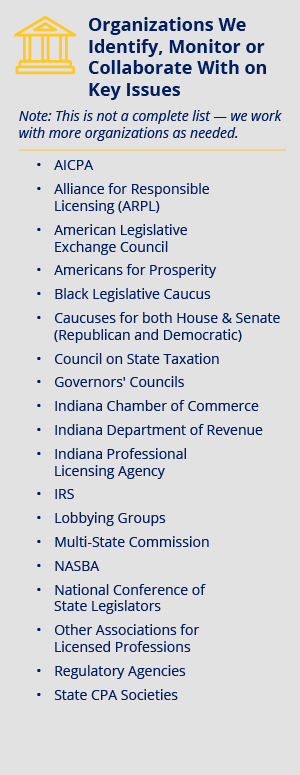
While the Indiana legislature is only in session part of the year, advocacy never stops. That’s why the INCPAS team is at work year-round to support members and the profession.
This work may seem like somewhat of a mystery, but we have an organized process to cover and vet any and all topics or issues of concern that might come into play. This process is heavily reliant on member input, expertise and engagement.
How INCPAS works to identify key issues
 The number of issues and legislative topics that could impact the profession is extensive — and so is our process for staying on top of them!
The number of issues and legislative topics that could impact the profession is extensive — and so is our process for staying on top of them!
Identifying our key issues is a year-round activity that involves members’ input, perspective and expertise and keeping up with multiple organizations, councils and other states.
“We generally are checking with any other organizations that are related to business issues, licensure and tax,” Sherrill Rude, CAE, INCPAS vice president – advocacy, explained.
This can include:
- National organizations such as AICPA, NASBA, ARPL (Alliance for Responsible Licensing), other state CPA societies and similar organizations for other professions in Indiana to stay on top of overall licensing policy issues and changes.
- Agendas from legislative caucuses, including the Republican and Democratic caucuses for both the House and Senate. They help us stay up-to-date on their key legislative issues that could impact our members and the profession. We also refer to the Black Legislative Caucus, particularly for issues related to DEI, education, internet access, and other issues that tie into our overall pipeline and DEI initiatives and will create a stronger workforce.
- National and local groups that have influence with legislators, including the National Conference of State Legislatures, the American Legislative Exchange Council, Americans for Prosperity and Governors’ Councils.
- Related organizations and councils like the Council on State Taxation and the Multi-State Commission. These groups typically develop model pieces of legislation that states can copy and tweak. “We pay attention to what they have on their agenda and what model legislation they are developing,” Rude said. “Those are things we will normally talk about with the different member groups that are meeting and forming the legislative agenda. We’ll discuss the model legislation and ask, is this something we need to be concerned about? What are the pros and cons? Is it something we need to address or not?”
- Other general issues emerging across the country. Many times lobbying groups target states that don’t have extensive resources to fight an issue, like licensure deregulation in states with a small CPA society staff or none at all, because they know there won’t be much of a battle. They typically target several states each year with the expectation something will stick. “These are things we have to pay attention to, and work with the national organizations who are always looking at the same thing,” Rude explained.
"We’ll discuss the model legislation and ask, is this something we need to be concerned about? What are the pros and cons? Is it something we need to address or not?”
We also look to our relationships with organizations where we share common ground, like the Indiana Department of Revenue and the Indiana Chamber.
How do we keep track of it all? In addition to the support of our lobbyist, the INCPAS team maintains a list of links to various organizations. It’s reviewed and updated regularly.
We also develop an extensive keyword list of what to be on the lookout for before and during each legislative session. The current list is approximately 130 keywords long and includes items like artificial intelligence, blockchain and bitcoin, expungement of crimes, firm ownership, interest and penalty, license reciprocity, tax holiday, and more.
Building the agenda
The Government Relations Advisory Council (GRAC) and Tax Resource Advisory Council (TRAC) are leaders in building our legislative agenda. Both are made up of INCPAS member volunteers.
GRAC members primarily work with the Indiana Board of Accountancy and the Indiana Professional Licensing Agency and address issues related to licensure, business, and accounting and auditing.
TRAC focuses on state and local tax, conformity with Internal Revenue Code and tax court decisions, taxpayer advocacy and promoting an overall positive business climate in Indiana. They primarily work with the Indiana Department of Revenue.
“Anyone is invited to participate on these councils,” said Courtney Kincaid, INCPAS president and CEO, noting that diverse representation across the board is important for these councils. (Explore these volunteer opportunities and others here.)
These councils meet at least twice a year to discuss the issues at play. During this time, they refer to INCPAS’ policies and position statements as well as our internal decision-making framework that helps provide deeper clarity on whether an issue or topic makes sense for INCPAS to have involvement.
All of these conversations help determine what issues we will Lead, Engage and Monitor, though they may change as bills are introduced and work through the Statehouse.
Official conversations start in spring following the end of the legislative session and continue over the summer months. During this time, we meet with regulatory agencies to discuss their legislative priorities and monitor the work of interim committees for issues that may be legislated.
During these conversations, other considerations that come into play are feedback from CPA Advocates (we often ask their opinion on topics and issues via online community and the monthly newsletter) and any additional member feedback we receive at town hall events, during conferences, via calls, and at other meetings and events.
Increasingly, we also use ad hoc committees or working groups. These are made up of members and stakeholders we recruit with specific expertise who can help provide a better perspective on an issue.
Once GRAC and TRAC have agreed on the agenda, they present it to the INCPAS Board of Directors in the fall.
How we work with legislators
Developing our agenda is just one piece of the advocacy puzzle. Developing relationships with legislators is critical to advocacy work. For INCPAS, this comes in a few forms.
INCPAS works with a dedicated lobbyist, Lou Belch, from The Corydon Group. On a day-to-day basis, he helps us stay in tune with what’s happening at the statehouse, providing weekly legislative updates and tracking the progress of bills we’re monitoring. (Be sure you’re signed up as an INCPAS CPA Advocate to stay up-to-date with these reports.) When key bills or issues arise that are on our legislative agenda, Belch also communicates directly with legislators on our behalf to share our views and work toward influencing legislation.
But our lobbyist isn’t the only connection we have to legislators. Rude and Kincaid are also registered lobbyists for the statehouse and able to represent INCPAS at committee meetings and public hearings.
We always encourage our member advocates to follow and reach out to their legislators. Some members go above and beyond by attending events their legislator holds or having coffee with them — both opportunities for face-to-face time that helps position them and INCPAS as trusted business advisors with expertise on the state of business.
“We rely on those members to keep us in the loop,” Rude said. Oftentimes after a meeting with a legislator, a member will call her to discuss what the legislator is interested in and if it makes sense for INCPAS to support or aid in drafting legislation.
“It’s helpful to know what they’re working on because we have members who are in just about any industry in the state,” said Rude. “So if a legislator says, ‘my legislation is going to deal with medical insurance’ and we have members who work in that area, we can put them in touch with that legislator and they would have access to that resource.”
Being at the table
In a perfect world we could take a stance on an issue or bill, voice our thoughts to legislators, and have everything we say taken into consideration. But this process isn’t perfect. In fact, it can be quite messy, Rude shared.
"There will always be a new bill, a new issue or a new industry or technology change that will impact the profession. That’s why we will continually need INCPAS members to join us in engaging with the process.”
There has to be a balance of feasibility. There’s give and take. When there’s a firm stance on something, like when a bill goes into effect, and other players at the table aren’t willing to bend, it becomes about creating the most positive outcome.
“We have to ask, what are the next best things that we can go for in order for us to successfully pass this legislation in a way that is beneficial or as implementable as possible for our members?” said Kincaid.
Engaging as a member
The advocacy process is never-ending. There will always be a new bill, a new issue or a new industry or technology change that will impact the profession. That’s why we will continually need INCPAS members to join us in engaging with the process.
Here’s how you can get started:
Our advocacy team is always available for suggestions, questions and assistance!
Your advocacy contacts are: